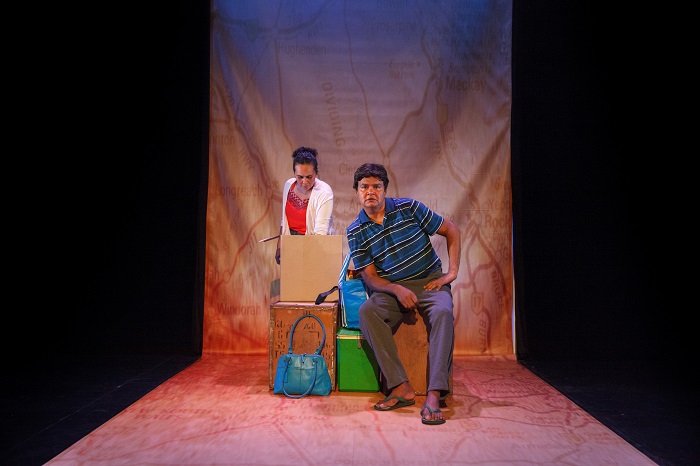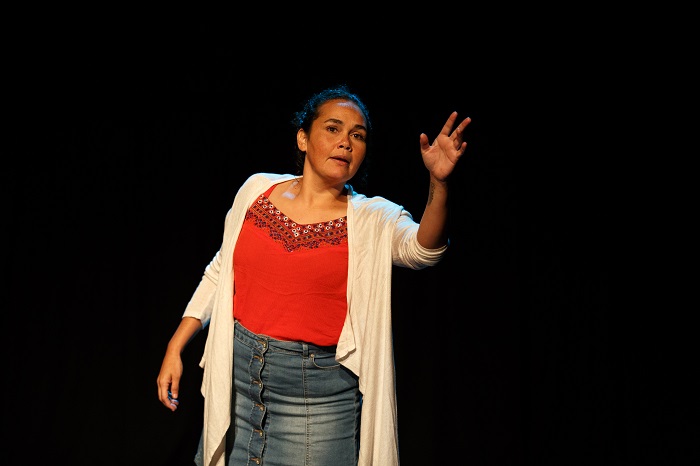Katie Beckett and Kamahi Djordan King in Which Way Home. Photo by Snehargho Ghosh.
In Katie Beckett’s first full length play Which Way Home, Tash and her father embark on a road trip from Ipswich, Queensland, to their home country Goodooga, NSW. Throughout the journey, Tash recounts memories of being a young girl raised by her Aboriginal father after her mother passed away. It’s not all smooth sailing, and the antagonisms which exist between children and their parents are by no means glossed over, but at the heart of the story is a very special bond between an Aboriginal father and daughter, a portrayal which is curiously absent from the Australian cultural landscape.
Which Way Home opened back in 2016 bang smack in the middle of the debate sparked by a Bill Leak cartoon published in The Australian which depicted Aboriginal fathers as drunk neglectful parents of criminal children. The cartoon caused a furore and started a conversation about what constituted racism. Whether intentional or not, the fact remains that the reason such a depiction was seen as racist was because there were literally no positive depictions of Aboriginal fathers in our media landscape that could serve to challenge the stereotype. Until Beckett’s play opened and presented a much needed counterpoint to the stereotype.

Katie Beckett and Kamahi Djordan King in Which Way Home. Photo by Snehargho Ghosh.
In essence, the story is a simple one of a clearly loving father and daughter who are not without their antagonisms but who’s bond is cemented in unconditional love. Later in life, their roles have reversed – Tash assumes the role of the parent, scheduling the pitstops, planning the route, monitoring her father’s diabetes, while he cheekily sneaks Minties and unscheduled snack breaks.
The semi-autobiographical roots of the story lend authenticity to the anecdotes of their past, and it is hard not to feel warm fuzzies in the presence of such idiosyncratic characters. Beckett plays Tash with the confidence of a genuine life lived whilst Kamahi Djordon King emanates warmth and humour as the bumbling, loveable dad who can’t help holding his daughter to higher standards than those he lives by. But however much screen time he occupies, this is clearly Tash’s story, and the depiction of Kings character is clearly through the lens of a daughter’s tribute. As grains of sand passes through Niklas Pajanti’s evocative lighting design like a bottomless hourglass, we are reminded of the sense of time the events take place in – one lifetime, which is simultaneously finite and eternal.

Katie Beckett in Which Way Home. Photo by Snehargho Ghosh.
Beckett’s writing here is seamlessly transformative, especially for a first time playwright, although clearly this work is a lifetime in the making. The impact of this journey creeps up on you and will likely stay with you long after the curtain has fallen. In this microcosm of the world, we don’t engage too directly with the politics of race and Australian culture, but the context of the story renders the politic ever present and inescapable. What will it take to reframe how we see Aboriginal parents? We’d have to take the scenic route, keeping our eyes open to each and every detail on the long road home.
Rating: 4 stars ★★★★
Which Way Home
PRESENTED BY ILBIJERRI THEATRE COMPANY
Writer Katie Beckett
Director Rachael Maza
Performers Katie Beckett & Kamahi Djordon King
Sound Designer Mark Coles Smith
Set & Costume Designer Emily Barrie
Lighting Designer Nik Pajanti
Dramaturge Jane Bodie
Stage Manager Kellie Jayne Chambers





